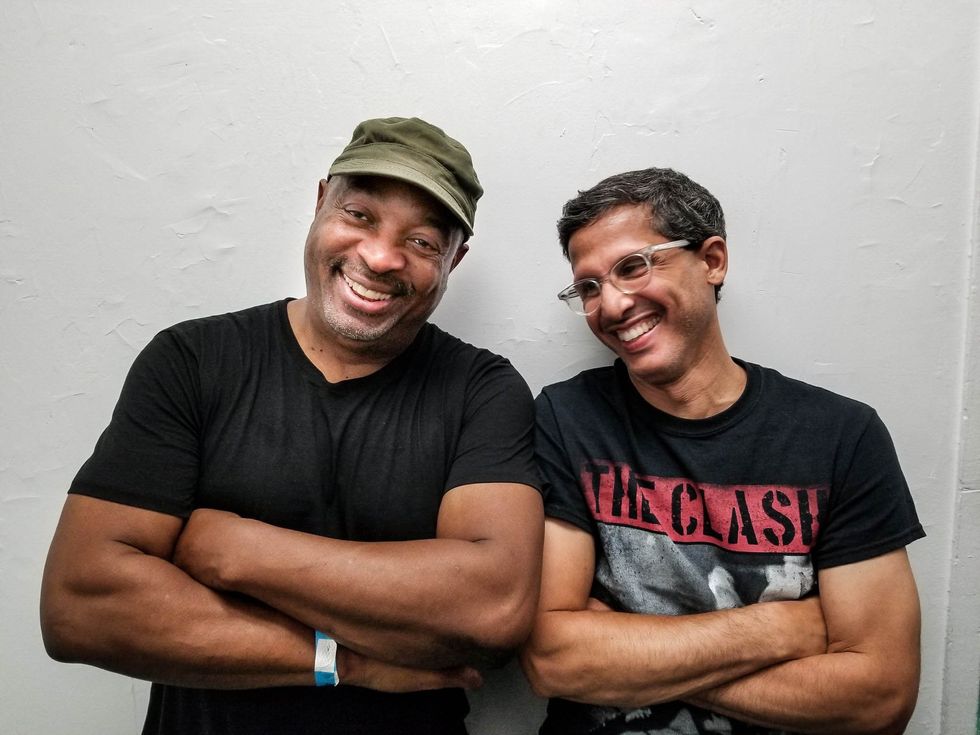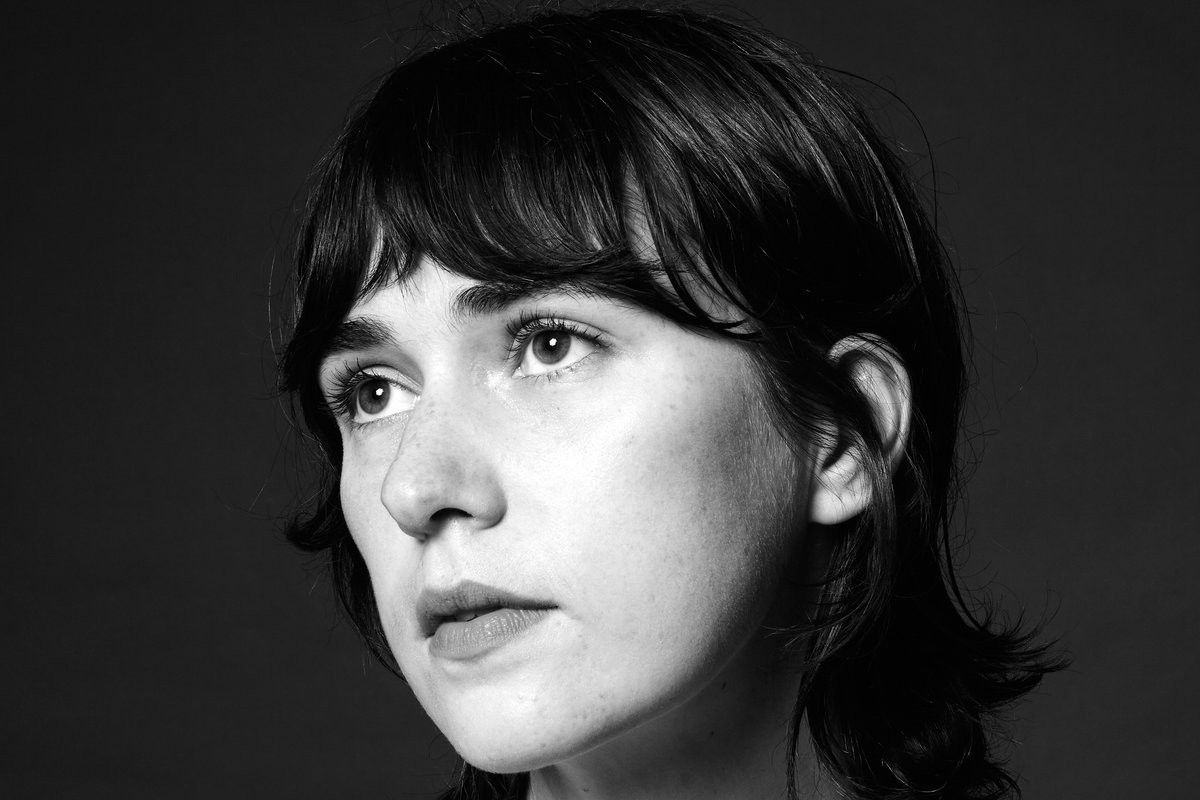A Conversation With .. Errol Nazareth
The veteran Toronto music journalist and radio host reflects upon a fascinating career, musically formative years in England, a long friendship with Chuck D (pictured), and the eclecticism of his CBC show.

By Bill King
It was 33 years ago when a voice on the other end of the line introduced himself as a writer for the Scarborough Mirror and wanted to talk jazz. This was the year CIUT 89.5 FM began broadcasting beyond the campus of the University of Toronto. The years that followed saw Errol Nazareth cut a path through Canadian pop and a complacent music scene and dedicate long hours in support of Toronto’s ethnically diverse music scene. With every career leap Nazareth continued to champion an underground network of hip-hop, rap and world music which today rules. Nazareth resides at the epicentre of an ever-evolving music community with his weekly Big City, Small World radio show, Saturdays 5-6 p.m. on CBC Radio One - this after a long stint as music columnist at the Toronto Sun. He’s now in the classroom sharing and teaching. Recently, I pinned the busy man down for this chat.
Bill King: How were the early days of youth spent?
E.N: Lived in Kuwait until I was 9, then boarding school in India for about 8 years, and school in the UK for 3 years.
B.K: Were you a big reader?
E.N: Always. Magazines, books, fanzines, newspapers.
B.K: What kind of student were you?
E.N: Average. I disliked school and college, to be honest.
B.K: Where does your interest in music come from?
E.N: My dad would play lots of amazing jazz records around the house when I was growing up. Living in England, though, really was a gamechanger – both politically and musically. I was there when punk and ska and the New Romantic movements were exploding. I loved it all.
B.K: Have you always wanted to be a journalist?
E.N: Yes. Always loved the written word and always been an information junkie.
B.K: What was your first big writing assignment, and how did it go?
E.N: Hard question. I have covered so many stories. I do remember reporting on the KKK handing out leaflets in Georgetown one Saturday many, many years ago. That story made the cover of the Sunday Sun, which had a massive readership. Oh! Finding about from someone inside MuchMusic that it was planning to ban Public Enemy’s videos sometime in the '90s. I wrote about it in NOW, all the major dailies followed suit and there was a protest outside the station.
B.K: You’ve always reached out to others throughout your career. Where does this come from?
E.N: Thanks! I love the idea of connecting with people, I mean really connecting and finding out what makes them make the beautiful music or art that they do. What inspires that? What do they hope the takeaway is? I love telling those stories.
B.K: Music trends come and go. Which have had a lasting impact, and which were meant to fade?
E.N: The ones that have had an impact on me? I would say classic reggae, British punk and ska, and all that great new wave/pop that was made in the 80s. There’s an energy and passion and sense of purpose in that music, if that makes sense, that hit me hard in different ways. Vapid pop has its place but it’s not for me. It’s like eating fast food – it hits the spot and then you forget about it.
B.K: Although of Indian heritage, you’re a champion of multi-cultural and African influence. What is that connection?
E.N: Living in England politicized me to no end. For the first time in my life, I felt different, felt like an outsider. This led me to gravitate to other marginalized communities/ communities of colour and then wanting to share their stories.
B.K: You see the big picture – the inequities people of colour and those who exist below the poverty line face daily – and have been passionate about finding solutions. How have you been able to express your frustrations and still work within a system that has been mostly in denial?
E.N: Great question! Yes, I have been able to express my frustrations at the status quo, vis a vis, the lack of diversity in the media and some sections of the music industry through public talks and even in the classroom (I teach media writing and radio broadcasting courses at Humber and at Centennial). But ranting and raving just makes you bitter so I’ve made the effort to enter the media and show by example – that our voices are as important, they matter, and we have interesting stories to tell, too.
B.K: We are becoming a world of fractured allegiances. You are either with me or against me. How do we find common ground and learn to respect our differences?
E.N: Keep talking to each other instead of yelling at each other. Keep an open mind and try and embrace other points of views. Be willing to be challenged and challenge other in a rational, respectful way.
B.K: Which writing job came first – Eye Weekly, NOW Magazine or the Toronto Sun? How did the assignments and writing content differ?
E.N:NOW Magazine. I was a news reporter covering black politics, racism, censorship and municipal issues.
I loved working at The Sun. It was a great experience writing a music column and being a general assignment news reporter. That fed both my passions. And the people there were like family.
At EYE Weekly, I wrote a music column similar to the one The Sun published.
B.K: When did you enter radio and in what capacity?
E.N: I began working at CBC as a freelancer around 20 years back. I started doing stuff for shows like Definitely Not the Opera. Then I was invited to talk about music every week on Metro Morning and on Big City Small World. Several other opportunities have presented themselves since.
B.K: You’ve been at CBC over 20 years – any one event come to mind that said radio is where I always want to be?
E.N: Tough question! No one event, but the sincere and heartfelt feedback on social media from listeners who truly appreciate hearing a new piece of music or an interview or a story behind the music. Making that connection is magical.
B.K: What’s the story behind you and Chuck D’s friendship?
E.N: Public Enemy played the Concert Hall a year before their iconic album, It Takes A Nation of Millions To Hold Us Back, was unleashed on the world, and I, along with 3 other writers, spoke with Chuck for more than 2 hours at a hotel on Carlton Street before the show. It was an amazing experience!
Speaking of making connections, I felt we really connected, and I would often send him clippings of hip-hop stories I wrote for The Sun. A friendship developed and he blew my mind when he credited me on Fear of a Black Planet and mentioned me in his autobiography. We’ve been friends for more than 30 years.
B.K: Big City, Small World – how would you define your popular late Saturday afternoon music show?
E.N: A super eclectic show that reflects the awesome diversity of my city. You’ll be hard-pressed to find a show that plays Nigerian pop, classical Indian, dub, Middle Eastern, Punjabi music and jazz in the space of an hour on Toronto’s FM dial
B.K: The Toronto Sun column ended after a long run and you were a champion of hip hop and rap. Do you still hear from that community that depended heavily on your Friday column?
E.N: I’m always surprised when I’m at an event and someone comes up and tells me how much that weekly column meant to them. It’s humbling!
B.K: What is the focus of your Arts & Entertainment Journalism program at Centennial Story Arts Centre.
E.N: I teach 2 media writing courses that prepare students for our TV/Broadcasting and Journalism courses. More than that, it’s designed to really improve their writing skills and to recognize the importance of being versatile/being able to write for different platforms.
B.K: What’s playing in the background?
E.N: BBC Radio 6. One of my favourite radio stations!
B.K: What’s dinner like around the family table? Who gets in the last word?
E.N: My oldest!

















